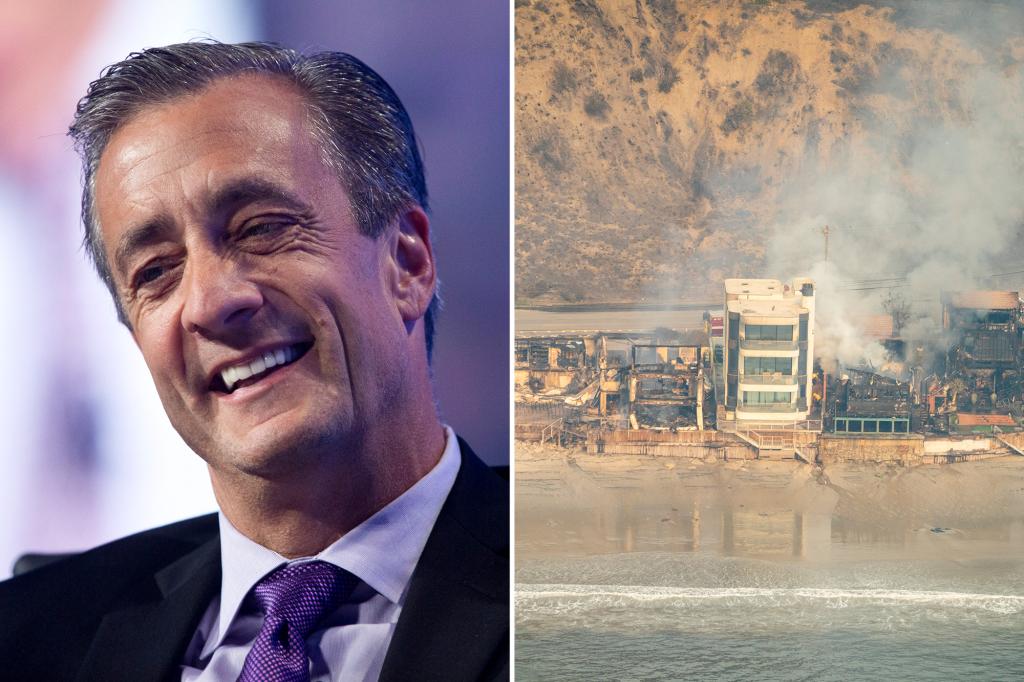David Steiner, a retired waste management executive and lawyer, experienced a mixture of disbelief and gratitude when his Malibu mansion miraculously survived the devastating Palisades Fire. The fire, which ravaged the affluent coastal community, left a trail of destruction, reducing multimillion-dollar homes to ashes. Steiner, residing in Texas, initially feared the worst when a local contractor sent him a video depicting flames engulfing his property and neighboring houses. The footage painted a grim picture, leading Steiner to believe his stunning three-story, nearly $9 million house was lost. The sheer intensity of the blaze seemed insurmountable, suggesting nothing could withstand its destructive force.
News of the fire’s impact spread rapidly, and Steiner soon found himself receiving messages and pictures from people who had seen images of his house circulating in news reports and on social media. To his astonishment, the photos revealed his distinctive white, three-story structure standing virtually unscathed amidst a landscape of charred remains. The sight of his home, seemingly untouched by the inferno, evoked a powerful sense of relief and wonder. His wife sent him a message that read, “Last house standing,” a phrase that brought a smile to his face during an otherwise distressing period. The unexpected survival of his property, while others were tragically lost, led Steiner to reflect on the capricious nature of the disaster.
Steiner attributed the remarkable resilience of his house to its robust construction, which he believed was likely designed to withstand earthquakes, a common threat in the region. The structure featured stucco and stone walls, a fireproof roof, and deep pilings extending approximately 50 feet into the bedrock, designed to provide stability against powerful waves crashing against the seawall below. He acknowledged that the possibility of a wildfire reaching the Pacific Coast Highway and igniting such devastation had never crossed his mind. His primary concern had always been earthquakes, and he had confidently believed his house would be the last thing standing in such an event. Ironically, his prediction proved true, albeit under vastly different circumstances.
The realization that his property had survived a raging wildfire while neighboring houses succumbed to the flames left Steiner pondering the unpredictable nature of disasters. He admitted to never having imagined a wildfire posing a significant threat to his coastal home. He had always envisioned earthquakes as the primary hazard, and the house had been built with that specific threat in mind. The fireproof roof and sturdy stucco and stone construction, designed to withstand seismic activity, inadvertently provided the necessary protection against the intense heat and flames of the wildfire. Although grateful for the fortuitous outcome, Steiner remained mindful of the devastating impact the fire had on others.
Despite the immense relief at his home’s survival, Steiner emphasized that material possessions were replaceable, while human lives were not. He underscored the importance of empathy and perspective during times of crisis. He received messages of support and prayers from concerned individuals, but he urged them to direct their compassion towards those who had lost their homes, emphasizing the greater tragedy they faced. He acknowledged the emotional toll of witnessing his property engulfed in flames, but maintained that the loss of a material possession paled in comparison to the loss experienced by others who lost their primary residences.
Steiner explained that the Malibu mansion was not his primary residence, nor did it hold irreplaceable family heirlooms or sentimental items. He had purchased the property when two of his three sons were attending school in the area, providing a convenient place for the family to stay during visits. With his sons no longer studying in the area, the house was vacant at the time of the fire, further diminishing its personal significance. He reiterated his empathy for those who lost their homes, acknowledging the profound impact such a loss would have on their lives. His relief was tempered by the knowledge of the widespread devastation and the suffering experienced by others in the community. He recognized his fortunate position and emphasized the importance of supporting those who had suffered greater losses.

